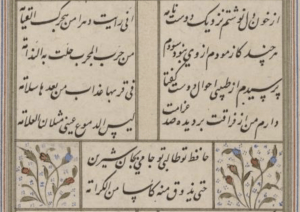One of Hafez’s Molamma’āt (mixed Persian and Arabic) ghazals illustrates not only the unique transformation of Arabic prosody in Persian poetry, but also Hafez’s unique gift for copying, transforming, and improving the verses from previous ghazals (in this case a ghazal by the seminal master of the ghazal, Sanā’ī):
Sana’ī
Translation:
Last night a letter arrived unexpectedly from my beloved.
She said: “My heart has seen the pangs of the resurrection in being
parted from you.”
I said: “Does your loving heart have some sign of suffering?”
She said: “Are not the tears in my eye enough of a sign for
you?”
She said: “What are you planning?” I said: “A journey.”
She said: “Go in health, happiness and safety?”
I said: “You are not trustworthy.” She said: “Test me!”
[I replied:] ” Whoever tests an experienced person will surely regret it.”
I said: “Farewell! You shall not come and conquer my breast.”
She said: “So you want union with me in secret? No, by grace!”
She said: “Take hold of my tresses!” I said: “Scandal will come”
She said: “Do you really not know about love and scandal?”
Original:
دی ناگه از نگارم اندر رسید نامه
قالت: رای فوادی من هجرک القیامه
گفتم که: عشق و دل را باشد علامتی هم
قالت: دموع عینی لم تکف بالعلامه
گفتا که: می چه سازی گفتم که مر سفر را
قالت: فمر صحیحا بالخیر و السلامه
گفتم: وفا نداری گفتا که: آزمودی
من جرب المجرب حلت به الندامه
گفتم: وداع نایی واندر برم نگیری
قالت: ترید وصلی سرا و لا کرامه
گفتا: بگیر زلفم گفتم: ملامت آید
قالت: الست تدری العشق و الملامه
Rumi
Translation:
I tested you a lot, but it did not help me
Whoever tries the experienced will come to regret it
Original:
بسيارت آزموذى امّا نبوذ سوذم من جرّب المجرّب حلّت به الندامة
Hafez
Translation:
From my heart’s grief I wrote a letter to my beloved.
For an age, from your absence, I have witnessed the resurrection
I have a hundred signs of separation in my eye
Are not the tears of these eyes of mine for us a sign?
However much I tried, she did not help me
Whoever tries the experienced will regret it
I asked a doctor about the state of my beloved. He said:
Suffering is in nearness to her, health is in distance from her.
I said: Will scandal come if I wander about your alley?.
By God! We have never seen a love without scandal.
Hafiz has come like one seeking a cup even at the price of his sweet soul,
that he might taste from it, a goblet of grace.
Original:
از خون دل نوشتم نزدیک دوست نامه
انی رایت دهرا من هجرک القیامه
دارم من از فراقش در دیده صد علامت
لیست دموع عینی هذا لنا العلامه
هر چند کآزمودم از وی نبود سودم
من جرّب المجرّب حلّت به الندامه
پرسیدم از طبیبی احوال دوست گفتا
فی بعدها عذاب فی قربها السلامه
گفتم ملامت آید گر گرد دوست گردم
و الله ما راینا حبا بلا ملامه
حافظ چو طالب آمد جامی به جان شیرین
حتی یذوق منه کاسا من الکرامه

From: François de Blois, “A Bilingual Poem by Ḥāfiẓ,” Oriente Moderno , 1996, Nuova serie, Anno 15 (76), Nr. 2, LA CIVILTÀ TIMURIDE COME FENOMENO INTERNAZIONALE. Volume II (Letteratura — Arte) (1996), pp. 379-384.








































